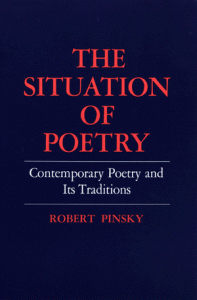July 1, 2013
What is the state of contemporary poetry?
by Emma Aylor
Harriet reports on a series of essays and reactions to the question of what some call “the state of American poetry.” The present conversation began with Mark Edmunson’s “Poetry Slam: Or, The decline of American verse,” which appears in the July 2013 issue of Harper’s and which, as its title indicates, responds almost physically to a poetic Edmunson sees as “hermetic” and “overheard,” to poems that—though “good in their ways”—“simply aren’t good enough.” Edmunson goes so far as to disparage the “unique voice” contemporary poets employ, preferring that the poet “go plural,” go for the “we.” Some of our most treasured contemporary voices prove too “unique” for Edmunson; he singles out John Ashbery’s “perpetual hedging” and writes that Anne Carson’s verse is “obscure, mannered, and private” (though, loving Carson, this easily bends complimentary).
Ron Charles, who reacted to the essay on the Washington Post Style Blog, summarizes the central flaw in Edmunson’s argument in one snip: “‘One can’t generalize it all,’ Edmunson warns, before generalizing about it all.” After glossing the essay, Charles remains hopeful about what the polemic could generate. “The very best result,” he writes, “might be some illuminating essays on all the politically and socially courageous poets who are, in fact, publishing today.”
Seth Abramson does just that in “Why Is Contemporary American Poetry So Good?” on HuffPost Books, in which he responds by anaphora, webbing a complex and convincing argument of his own. A representative paragraph, which responds directly to Edmunson’s habit of generalization, reads:
Because you cannot judge the poetry of any era on the basis of a case-by-case aesthetic analysis of its merits, not only because there is too much poetry written and published for any of it to be considered an exemplar of an era, not only because aesthetics is a subjective enterprise, but also because it is in the nature of aesthetics to evolve and thus for an innovative aesthetics to be underappreciated in its own time, because we do not know what poems being written today will be considered of enduring value in the distant future, because what is Great is Great almost exclusively in retrospect. Because the present older generation of poets developed something called “poetics,” which is more useful than aesthetics because it uncovers not merely what is visually and aurally pleasing in a poem but also how that poem does something with language no other artform could do, and because that’s wonderful, and because the present younger generation of poets ahs in response developed a means of analyzing poetry “horizontally,” that is, by attending not merely to how a poem reads but how it changes the lives and relationships and lives in poetry and relationships to poetry of those who read or hear that poem, and that’s wonderful also.
And Abramson, too, can offer specific poets to support his arguments:
Because have you ever heard Matt Hart, Abraham Smith, Heather Christle, or Anthony Madrid read their poems out loud?
Because did you know you can probably find clips of them on YouTube?
Because have you ever read the poetry of Ariana Reines?
Abramson’s argument piles strata of proof for believing, as he does, in today’s American poetry; he affirms that ours is something simultaneously supportive, tangible, advancing, subcommunicative, collaborative, sustaining, saving. It is something more, a word used twenty-plus times in the essay. It is a space defined by multiplicity and possibility, “Because every poet you speak to could write their own list of reasons contemporary American poetry is so good, and it would be different from this one, but also similar, and equally true.”
The argument Abramson gives is refreshingly optimistic, but what compels me in reading it and its opposition is in the title of Harriet’s coverage of the conversation: “Why Is Contemporary American Poetry So Good/Bad?” Something about that slash gets at the arbitrary nature of the argument, as well as its enormous importance. The subject takes on the most meaning, in fact, in the complementarity of the two views: the fact that the “state of poetry” is contested at all indicates how much it can matter.
Emma Aylor is a former Melville House intern.
